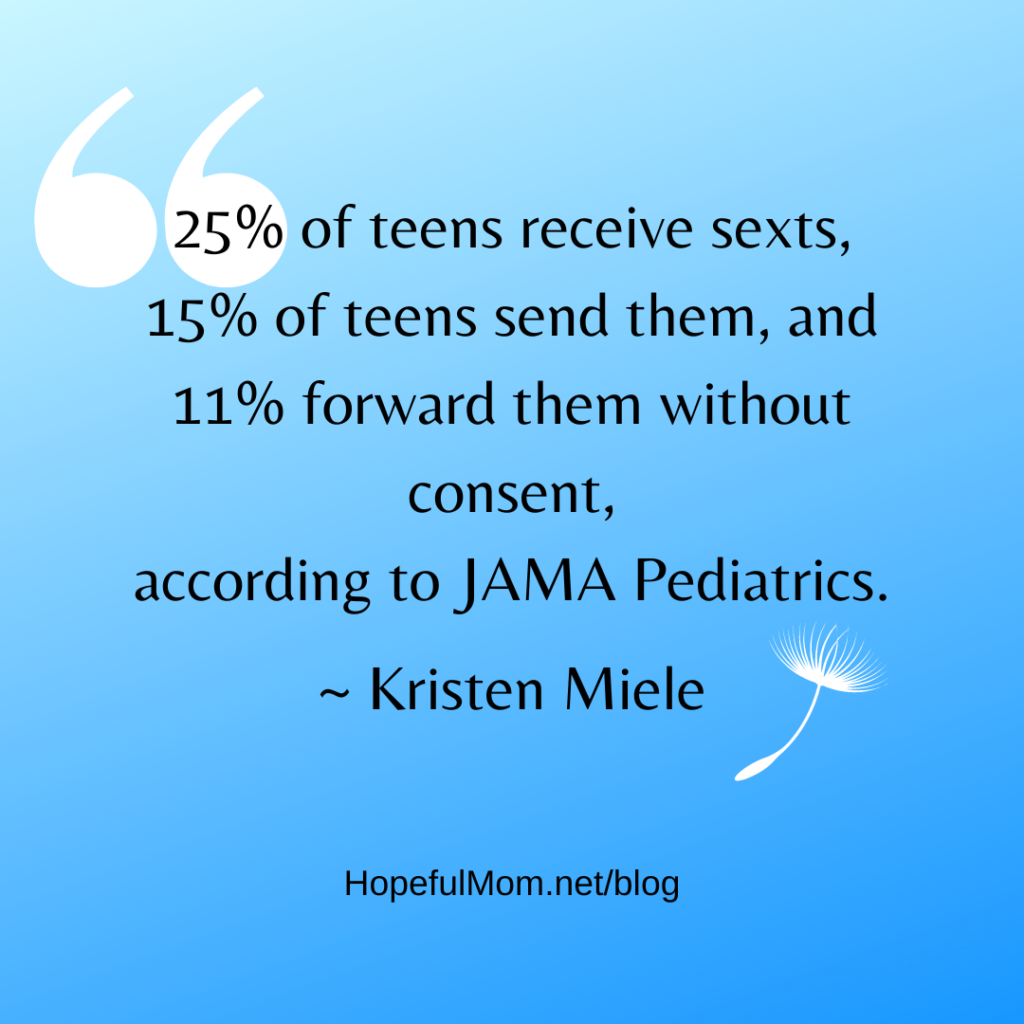Kristen Miele of Sex Ed Reclaimed is with us to talk about sexting. I met Kristen when she and I were each presenting at the SHE Recovery Summit. Her topic was sexting, and I quickly asked her to share her expertise at Hopeful Mom. I’m so grateful she agreed.
Sending nudes. Sharing pics. Snapu puas (sending nudes, the words upside down and backwards!). Texxxting. ‘You up?.’
Slang and teenagers go together like pumpkins and pie. There are many terms for sexting: sending explicit photos over the phone, in messages, and online. As adults, we’ll never understand all of the current slang. We actually don’t need to. However, what we do need to know is how to help our children prevent and heal from the epidemic of sexting.
A report in JAMA Pediatrics states over 25% of teenagers are receiving sexts, while 15% of teenagers are sending them. About 11% of teens are forwarding pictures they’ve received, without any consent from the sender. These text messages can end up as material for someone to ‘sextort’ the sender. Sextortion is a play on words combining sexting and extortion. The predators can be anyone. Predators typically have a goal of acquiring more and more explicit sexual content from the sender or child. Netsmartz, an online safety education program fighting the popularity of sexting, shares that, sadly, 4% of children engage in self-harm or attempt suicide as a result of sextortion.
No child wants to be manipulated or taken advantage of. Kids are being objectified, both by other kids and adults.
How can we help our children fight the widespread popularity of sexting?

Education
I’ve been a sexual health educator for over 10 years. I’ve seen the sad reality of the effects of sharing naked images. This is especially heartbreaking because zero children will benefit from sending nude photos or receiving them.
Education can be the first step in preventing the next generation from continuing this unhealthy cycle. Honest, willing, age-appropriate conversations are important when it comes to talking about sex. Do you shy away from talking to your child? Have you begun talking to your kids about porn?
- With children under nine, use the phrase ‘bad images,’ when they see a picture with someone naked.
- Frame your conversations with kids to be educational.
- Discussions should be informative, truthful, and practical.
What can kids do when another child passes over a phone or switches to a show where nudity is involved? Encourage them to ask the other child what they’re about to see and talk to an adult when they’ve seen something that makes them uncomfortable. Please notice I wrote the word ‘when’ in the prior sentence. Pornography is almost always seen by the time a child enters 6th or 7th grade.
Thankfully, parents have great options like filters on phones, shared parent-child social media accounts, options besides smart phones, and consistent conversations with their youth. Instead of allowing fear to rule in parenting when it comes to sex, join the offensive team, and move to defense only when you must. Engage in talks with your child about media you consume, news you overhear together, conversations which come up, and question that arise.
25% of teens receive sexts (nudes). Discussions about this topic with our children should be informative, truthful, and practical, says Kristen Miele of Sex Ed Reclaimed. Sexting: Helping Our Children Heal From This Epidemic #consent Share on XNext Steps
If your child has been exposed to porn (which includes sexting), tell them you’re sorry, because that is not a healthy, holy, or appropriate place for them to learn about sex. Offer to talk about it and consider counseling as well as new boundaries in the home or in relationships. Point to the good Creator who lovingly directs us that sex is best in a covenant relationship with a spouse. Anyone asking your son or daughter for pictures is not respecting them, loving them well, or treating sex with a right attitude. Sex is not cheap, nor is it ‘not a big deal,’ and their bodies are not for sale. Porn, however, teaches the opposite.
Model within your family how to cope with difficult feelings. Maybe you journal, pray, exercise, listen to music, write, or converse when things are hard. Help your child do the same. Kids turn to sexting and porn when they’re lonely, stressed, overwhelmed, bored, lack control in the home, or go through big life stressors. Help them to name their feelings, identify the truth in the feeling (if there is any), and move to healthy coping mechanisms in daily life.
Consider
Emphasize to your children that people asking for seductive pictures or nudes are untrustworthy, even if your child knows them, is dating them, or believes this will impress them or create intimacy. Can your child block that person or report them to an authority if applicable? Consequences children face post-sexting include ramifications in schooling or scholarships, as well as revenge porn and leaked images (once they send it, it’s out of their control).*
If you think your teen would disclose, you could start a conversation by asking if they’ve ever shared images, or received them. We never want to shame our kids, but we want to be honest about potential consequences. Sadly, whole websites have been devoted (and some shut down) to revenge porn, a direct effect of sextortion and sexting.
God has a beautiful design for sex and it’s so much greater than other people using us for our bodies. His design matters. He created our bodies and sex. Shouldn’t we look to Him to see what His purpose for them is? Does your child know what their Creator says? Jesus loves us, sees us, knows us, forgives us, and moves towards us, even in our great pain, shame, or suffering. He can do this in the life of your child.
Please share this post on social media, and remember to subscribe below for a FREE PDF download. Keep up with Hopeful Mom on FB and IG .
*Note from Barb: Anyone (including a minor) caught possessing or distributing explicit photos of minors can be legally charged.
About the author

Kristen Miele
Kristen Miele, MS in community health, is a sexual health educator who founded Sex Ed Reclaimed, LLC,a website dedicated to helping parents, schools, and churches talk to their kids about sex. Her content is split up in various curriculum packages for kids 3 to 18, based on age and stage of life. Sex Ed Reclaimed was born out of much prayer after returning from the mission field in Honduras, where Kristen taught health classes for 1st through 8th grade. She noticed many of the same questions about sex overseas as she’s encountered in the states. The mission of Sex Ed Reclaimed is to educate, empower, and encourage youth and adults to have consistent and honest conversations while accessing God-honoring sex-ed.



One Reply to “Sexting: Helping Our Children Heal From This Epidemic”